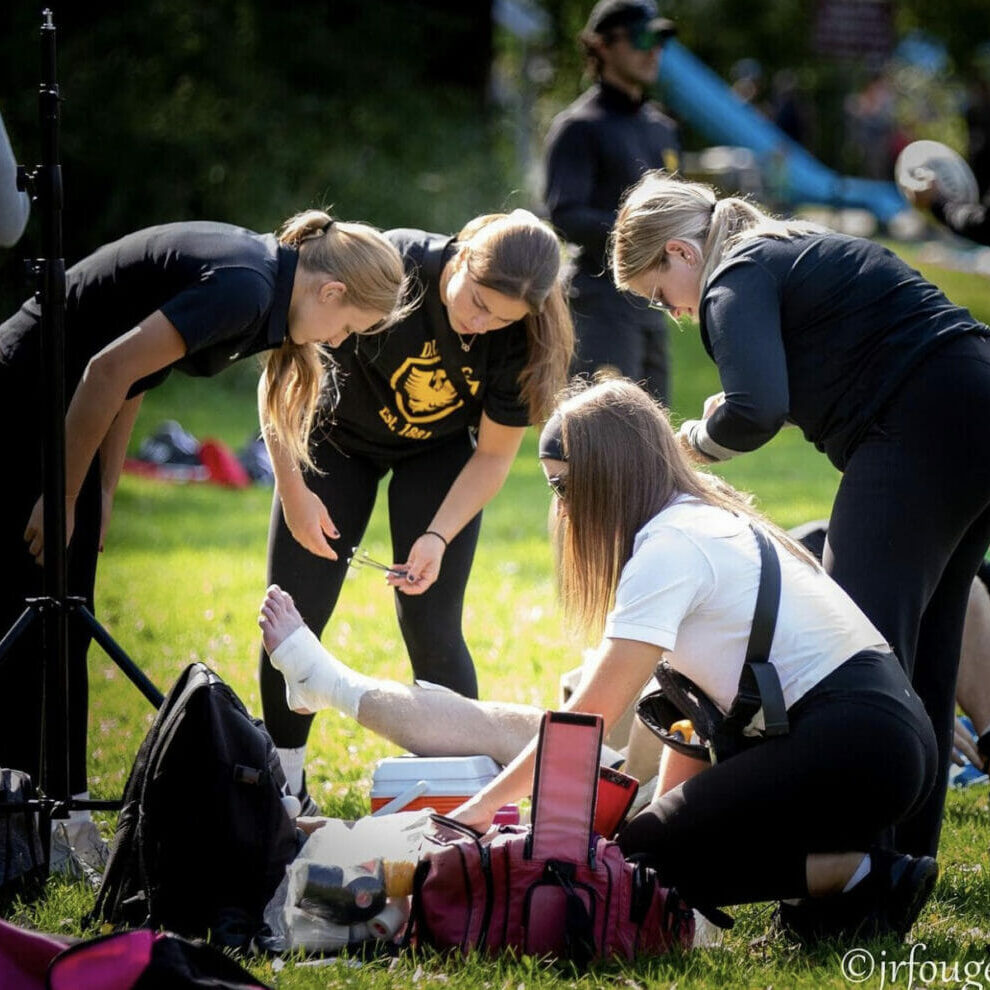
Dal Student Trainer Program more ready than ever to support Dal’s athletes
The program received help from the Jordan Boyd Foundation to secure all its trainers with AEDs
The Dalhousie Student Athletic Trainer Program is upping its own game this year by giving its trainers AEDs (automated external defibrillators) to have on hand, which will better support student athletes in the case of extreme cardiac emergencies.
According to Kyle Crosby, a physical therapist at the Dalhousie Physiotherapy Clinic and the lead on this project, the AEDs provide “a substantial increase in the quality of care the trainers can provide in an emergency scenario.”
The AEDs were donated by the Jordan Boyd Foundation, a Nova Scotia-based organization created in memory of its namesake. According to Crosby, the organization’s goal is “to make AEDs accessible at athletic events to provide [additional] safety measures.”
Jordan Boyd passed away in 2013, at the age of 16, while playing in his first practice for the Acadie-Bathurst Titan. It was later discovered that the hockey player suffered from an inherited heart condition, unbeknownst to him or his family.
“Long term, there is the potential to outfit all Atlantic University Sport (AUS) schools with AEDs,” said Crosby. “We were fortunate enough to be chosen for the pilot project.”
Allie Dehaitre, a student trainer for the Dal men’s rugby team and a third-year kinesiology major, said this addition to the team’s equipment will be a big help in the chance that something does go wrong on the field.
“Having it on hand for both us and the other trainers for the visiting team allows us to not have to figure out where the closest AED is and have to travel there,” said Dehaitre.
Dehaitre added that this is especially important for Dal’s club teams, like the men’s rugby team.
“Being a club team, we don’t necessarily play right on campus, so the AED is usually far away,” said Dehaitre. “This would make it very difficult to use if we ever needed it.”
Currently, the trainers work in teams of three, where one trainer always needs to be ready to run for the closest AED.
“Now that someone doesn’t have to run to get the AED, it just eliminates that whole stressor,” said Dehaitre. “Now you can have more trainers focused on the person at once.”
According to Crosby, the program currently has 11 AEDs between its many varsity and club teams.
The trainer program
Dehaitre only joined Dal’s Student Athletic Trainer Program this semester but she already feels strongly about the program’s benefits.
“It’s so fun to develop relationships with the athletes and coaches and you learn so much that you don’t learn in a classroom,” she said.
Dehaitre’s Foundations of Kinesiology professor was the first one to suggest she join the volunteer program but she didn’t end up joining until her third year.
Despite being a soccer and basketball player growing up, rugby was Dehaitre’s first choice after she met some of the university’s rugby players who told her how much fun their team was and how much they included their trainers in team life.
Being a contact sport, rugby also allows Dehaitre to get more hands-on experience dealing with and assessing injuries.
“There’s a lot of people laying on the ground and you don’t really know whether or not they’re injured or they’re just laying on the ground,” said Dehaitre. “I would say it’s more difficult [than in other sports] to assess what’s actually going on, especially since in any hit there could be a head injury so you have to assess for a concussion or maybe a shoulder injury.”
Even though her job is a lot of responsibility, Dehaitre still manages to have fun and some good laughs with the team.
She added that sometimes they just tape up for style points.
“Some of the guys will be so open about it and be like ‘I just do it so I can look cool’ and stuff like that,” said Dehaitre. “It’s always funny when guys are so open about it.”
A learning experience
Being new to the program, Dehaitre is glad to have had the support of her fellow student trainers, Marlee, Ryan and Harriet, to show her the ropes.
“During training camp, I was completely lost,” she said. “I had one training session before that and it just threw a million different tape jobs at me and I didn’t remember any of them but I was able to sit down with Marlee and Harriet and they would just walk me through the different tape jobs.”
Dehaitre also said that her team members were adamant about getting her as many experiences as possible to practice.
“When I’m not confident in something, they are very encouraging,” she said. “There’s no judgement if I do something wrong and they’re very willing to help if I do do something wrong.”
Volunteering with the rugby team has also made Dehaitre interested in pursuing a similar path post-graduation.
“It’s definitely a possibility that I want to look more into after being a part of this trainer program and I definitely enjoy it,” she said. “I just love being a part of a team. I would definitely consider it always being a part of my life.”






